I’ve seen plenty of wartime pictures of topless US soldiers in combat, especially in Vietnam and Korea. I can assume the US military would tolerate this practice for field dress, but I have hardly seen this to be the case with other militaries. So how did Asian soldiers dress during combat when it was hot? Could they go topless or was it a no-no? I haven’t see half-dressed Asian soldiers in any pictures, except when uniforms were not available.
in Vietnam they did not go shirtless when in combat. The closest I have seen to that is a flack vest with no shirt. Shirtless is likely to be a work detail or some off time.
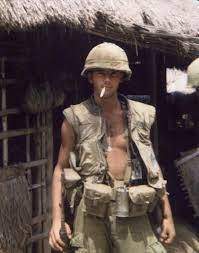
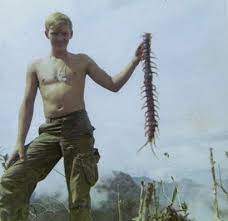
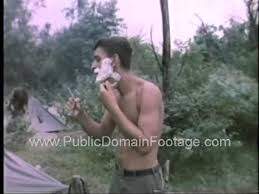
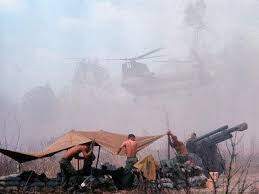
Australian soldiers
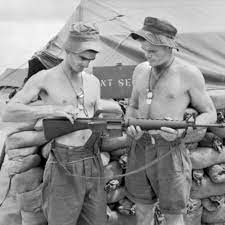
Shirtless people have been seen driving tanks and manning artillery, if not fighting hand to hand combat.
I was thinking about when they are out of line.
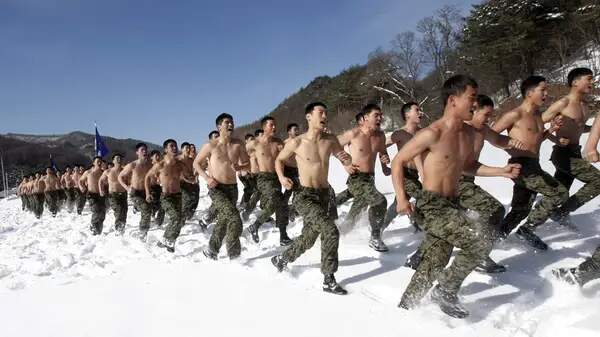
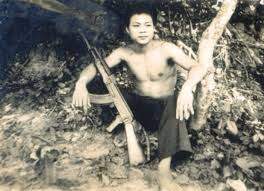
My father fought in Vietnam as part of ROK Army from 1971-1972. There are plenty of photos of him shirtless in his army photo album but not during combat of course. I agree that Korean military was a bit stricter about being clothed.
The reality is one of time and place. That was a Vietnam thing. You did not see that in the middle east. Vietnam was a draft army with discipline issues. Today is a volunteer army with higher standards.
I was in VN and off duty during the day or working during the day, you could go topless. ive seen Austrailians ,Roks Arvn as well as VC troops topless. however at night the mosquitos were so bad you didnt dare go topless. where I was Da Nang you didnt even cut your sleeves off . The bugs would eat you alive. in combat , everyone wore shirts, there was no “line”. .
Your wrong about the VN war being a draftees war Top , 2 out of 3 were volunteers , I was one of them.
2 out of 3 in ww 2 were draftees
I was with Special Operations Command Korea (SOCKOR) for several years. Those guys love to take their shirts off for PT at least. They love to find excuses on K Dramas to show them shirtless as well. One of my wife’s favorite Korean actors is actually former ROK SF. There are several scenes in Descendants of the Sun in which the nurses wait every day to see the soldiers running by shirtless.
On duty however their uniforms were always immaculate. In fact I never sewed my I love me badges on until being sent there. The first thing they do is look you up and down to see what you were all about.
Not all Asians are wild about taking their shirts off, nor should they be. In the Afghan culture even men should not unnecessarily show exposed skin on the arms and legs. As for our Army, I’ve seen SF guys manning OP’s in nothing but Ranger panties, flip flops, and a light coat of oil. But that’s us. Most Big Army officers would probably stroke out at the very thought of it.
I was thinking not merely of what other nations did but how they might have viewed Westerners being shirtless, as if it might be considered vulgar or rude. That I assume would make a difference.
I was going by photographs of shirtless tankers working on their equipment in hot weather and my book on Vietnam firebases, which pointed out that most people on them went without shirts. Of course firebases were their own worlds so there wouldn’t be locals around to get offended.
I originally joined the Army in 76. This was just after we left Vietnam in 75. I knew some fantastic career NCO’s, I met some POS enlisted and some clueless officers. This era was the worst of my military career. Signs were posted everywhere for GI’s to stay out. There were race fights in the theater. People were smoking hash in the barracks and in the tanks. Moral and respect was at a low point. I saw no effort being done to clean anything up. No one I saw wanted to be the ass who tried to clean things up. My enlistment came due and they tried multiple ways to get me to reenlist. Promised me a promotion to sergeant, asked what mos I would like to change to and even tried the easy job offering of being in charge of the wash ramp. I said sorry and changed branches of service an never looked back. I have never regretted for one minute having enlisted in the Marines. There was a world of difference.This not a knock on those who were drafted involuntarily. It is a statement on the condition of the service at the end of the Vietnam war. When the drug screenings went into effect, the services quickly cleaned up and became what it is today. In 76 through 79 I didn’t feel I could trust my fellow soldiers if the poop hit the fan. When I enlisted in the Marines I knew the people I served with would have my back to the end.
Just my experience, your mileage may vary.
I cant say much for the years after I enlisted, D E R O S ed and discharged . By !976 I was a happy civillian for years . So , as you say my milage ,will differ . In my day GI s were treated like criminals too. when I returned to the"world" we landed in Seattle Wash and were greated by protesters . On woman threw one of those big commercial garbage cans with the ash trays on top, at us. Me and a Marine next to me were hit with brown cigerrette water , and the cops told us to keep moving or WE`D get locked up . I didnt see the deteriation of the services like you did. I just get annoyed when people misrepresent us VN vets . WELCOME HOME Top .
Keep in mind that Western cultural impact on Vietnam did not start with US involvement in the war. French military operations pre-dated that by decades.
Give Google images a quick search for “French soldiers in Indochina.” Photos of soldiers shirtless and / or wearing shorts are pretty common.
Also, there are plenty of photos of the early days of Viet Minh troops in short pants and / or short sleeved shirts.
It was terrible that returning soldiers were treated as traitors. By 76 the quacks had returned to the wood works and I did not see them. Fortunately people today are savvy enough to understand the service member is not responsible for the politics of a military operation.
It started LONG before the french even before the Japanese Or Dutch ! . they said they were fighting for 1000 years . dont know how true that is but it was a saying
The culture of different countries is different and almost the dress there is also different from each other
I graduated from SFQC at the tender age of twenty. While that in itself is astounding, given my as yet undeveloped frontal lobe, what made it more unlikely was the fact that I, like several of my classmates, had zero military experience other than Basic, AIT, and jump school.
We weren’t even supposed to be allowed to enlist for SF, but due to the difficulty in getting active duty soldiers to go SF after the Desert One debacle, the Army came up with the SF Baby program - you could enlist for it, but you probably weren’t going to make it. (prior to that you had to be at least an E-5)
That way, after you rode that Blue Bird of Happiness from Camp Mackall back to Fort Bragg, they could simply kick you across the street in to 82nd Airborne Division, at that time known as the Jumping Junkies - already infantry and parachute qualified, and armed with just enough SF knowledge to make you annoying to everyone else. I think that was one of my biggest motivators for making it through.
Greeting from another “SF Baby.”
I enlisted right out of high school (1978) as an 11B with the SFQC as an enlistment “bonus” option (which then automatically included Airborne school, as a prerequisite to attend the SFQC).
We lost the vast majority of my class’s candidates in the swim test, of all things. Started off Phase I with 200+ (mostly SF Babies) taking the 6-event APFT and the “Ranger / SF swim test” and only went to Camp Mackall with about 50 guys who passed. After that, Land Nav culled out about half with another quarter falling by the wayside for various reasons. Ours was a Jan-Feb P.1 class, so things like having to break the ice on Drowning Creek before we could do the Slide for Life, rope bridges and poncho rafts took their toll (not to mention SFC Maxim’s morning road marches and “bouncing the gates” if someone fell out or failed the post march ruck weigh-in).
We passed out a total of 13 from P.1 to move on to P.2. (Yes, that was 13 out of the 200+ who had mustered at SF Company IB for “pre-phase” before Phase 1.)
I think I was fortunate enough to be simply too dumb to know what I was getting into or to understand that the training was anything special. I had nothing to compare it to, so I pretty much figured that breaking the ice and swimming in Drowning Creek or the Uwharrie river with snow on the ground was anything but normal training… LOL!
I think damned near every guy who passed out with my P.1 class also finally went to 10th Group!
Interesting. Bo Gritz Jr. was one of our tacs for pre-phase. He was an E-6 at the time.
During pre-phase, the movie Rambo: First Blood came out. Of course, we all went to the theater that Friday to see it. You can imagine the reaction when the deputy said “Those Green Berets, they’re real badasses.”
Our Phase I commandant was none other than Bob Howard. I am almost certainly correct in saying I graduated from the last hard class. I passed Phase I because of him. I will never forget that. E-5’s and E-6’s were quitting to the left of me and to the right. I couldn’t fathom it - I had spent my entire, albeit short, Army career in the front leaning rest. It was just more of the same to me.
Survival, piece of cake.
Land Nav - so easy I was helping other people find their points so they could pass.
Rucking - not easy, because Bob Howard led every one of them.
Patrolling - I looked for Ranger tabs when I needed reassurance as PL. Turned out I was doing pretty well.
Lack of sleep - brutal.
Lack of food - almost as bad.
Showering in ice cold water - who cared? We were at least getting to shower.
I did not break the ice on the slide for life, but the guy in front of me did. One cold ass winter. It snowed during Robin Sage. So cold showers were just a mild annoyance.
I also carried the sixty - gravy. Remember having to do pullups before chow? Everyone did it with slung weapons. They allowed those of us with a sixty to remove the barrel for pullups. I did not. A tac asked me if I was trying to show off. I said if I wanted to show off I’d do them with the sixty one handed. I spent the rest of Phase I doing just that.
Last few days we were on cruise control. Knot tying? I failed. Failed the retest as well. Was about to cry. Saw that Blue Bird of happiness and knew I was on my way back to Bragg, a few days short of finishing Phase I.
All of us who failed went to the Tac Shack. And that is where Bob Howard changed the arc of my life. He could not believe five of us had failed the bowline.
He told me to tie one, which I did. He studied it, and said, “I don’t know what’s wrong with this, but it’s just not right.”
Can you figure it out?